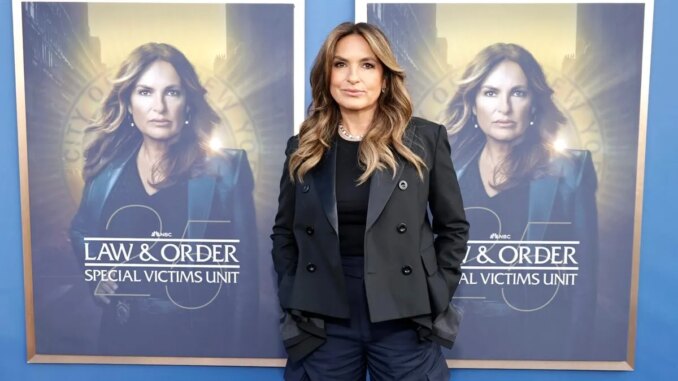
The Unyielding Gaze: Mariska Hargitay’s Enduring Reign on the SVU Throne (md07)
In the kaleidoscopic landscape of American television, where shows flicker and fade like transient stars, a rare few etch themselves into the very bedrock of the cultural consciousness. Among these titans stands Law & Order: Special Victims Unit, a narrative force now in its staggering 25th season. Yet, to speak of SVU as merely a show is to miss its beating heart, its enduring soul: Mariska Hargitay as Captain Olivia Benson. At 61, an age where many Hollywood leading ladies find their roles dwindling, Hargitay doesn’t just hold her throne; she commands it with a gravitas and an unwavering conviction that solidify SVU’s iconic status as profoundly as it has ever been.
The longevity of SVU itself is a phenomenon, a testament to its willingness to tackle the darkest corners of humanity with unflinching resolve. Since 1999, it has been a mirror reflecting societal anxieties, exploring themes of sexual assault, domestic violence, and human trafficking long before they became ubiquitous topics in mainstream discourse. It hasn’t shied away from evolution, adapting its storytelling to reflect changing legal landscapes, technological advancements, and a deepening understanding of trauma. This relentless pursuit of relevance, combined with a format that masterfully blends procedural drama with profound human stories, has cemented its place as a cornerstone of American television. It’s not just a show; it’s a cultural touchstone, often imitated but never truly replicated, its very premise resonating with an audience hungry for justice in a complex world.
At the epicenter of this enduring empire is Mariska Hargitay’s Olivia Benson, a character who has evolved from a sharp, empathetic detective to a resilient, battle-hardened captain, and now a chief, navigating the treacherous waters of crime and compassion. Hargitay doesn’t merely play Benson; she embodies her, infusing every scene with a nuanced blend of steely resolve and profound vulnerability. Her gaze, capable of conveying both deep sorrow and fierce determination, has become synonymous with the pursuit of justice for victims. The audience has witnessed Benson’s personal trials – her own experiences with assault, her struggles with motherhood, her enduring fight against systemic apathy – all rendered with an authenticity that blurs the lines between actress and character. This deeply personal investment is what makes Benson more than just a fictional construct; she is a trusted confidante, a beacon of strength for viewers grappling with their own pain, holding a mirror to our collective human experience.
What makes Hargitay’s continued dominance even more remarkable is the context of her age. At 61, an age often marginalized in the youth-obsessed landscape of entertainment, she stands as a powerful refutation of such superficial metrics. Her maturity is not a limitation but an invaluable asset. Benson’s leadership now carries the weight of decades of experience, her decisions informed by a lifetime of witnessing unimaginable cruelty and fighting for the voiceless. The gravitas she brings to her role as a commanding officer, a mentor, and a mother figure to her squad is enriched by the wisdom that only comes with age. Hargitay’s performance actively champions the idea that a woman’s power, influence, and sex appeal can deepen and expand with time, proving that the concept of a “throne” is not reserved for the young, but for those who have earned their reign through unwavering dedication and profound impact.
Beyond the screen, Hargitay’s influence further cements her iconic status. Her work with the Joyful Heart Foundation, dedicated to helping survivors of sexual assault, domestic violence, and child abuse, is a direct extension of Benson’s mission, demonstrating a rare alignment of art and activism. This commitment to real-world change imbues her portrayal with an even greater sense of purpose, making SVU not just entertainment, but a platform for advocacy. It is this synergy between the performer, the character, and the cause that elevates both Hargitay and SVU into the realm of true cultural iconography.
In an industry perpetually seeking the next big thing, Mariska Hargitay and Law & Order: Special Victims Unit stand as an anomaly – a testament to the power of unwavering storytelling and an extraordinary performance. At 61, Mariska Hargitay doesn’t just hold her throne; she reinforces it, demonstrating that true power and iconic status are forged in the crucible of dedication, empathy, and a relentless pursuit of justice. The unwavering gaze of Olivia Benson continues to shine, a beacon of strength that ensures SVU remains not just an iconic piece of American television, but a profound and enduring presence in our collective consciousness.
